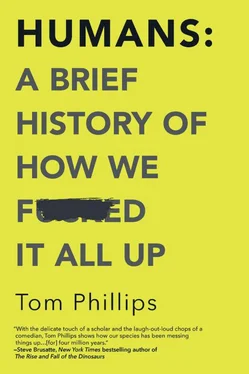Tom Phillips - Humans - A Brief History of How We F*cked It All Up
Здесь есть возможность читать онлайн «Tom Phillips - Humans - A Brief History of How We F*cked It All Up» весь текст электронной книги совершенно бесплатно (целиком полную версию без сокращений). В некоторых случаях можно слушать аудио, скачать через торрент в формате fb2 и присутствует краткое содержание. Город: Toronto, Год выпуска: 2019, ISBN: 2019, Издательство: Hanover Square Press, Жанр: История, Юмористические книги, на английском языке. Описание произведения, (предисловие) а так же отзывы посетителей доступны на портале библиотеки ЛибКат.
- Название:Humans: A Brief History of How We F*cked It All Up
- Автор:
- Издательство:Hanover Square Press
- Жанр:
- Год:2019
- Город:Toronto
- ISBN:978-1-48805-113-5
- Рейтинг книги:4 / 5. Голосов: 1
-
Избранное:Добавить в избранное
- Отзывы:
-
Ваша оценка:
- 80
- 1
- 2
- 3
- 4
- 5
Humans: A Brief History of How We F*cked It All Up: краткое содержание, описание и аннотация
Предлагаем к чтению аннотацию, описание, краткое содержание или предисловие (зависит от того, что написал сам автор книги «Humans: A Brief History of How We F*cked It All Up»). Если вы не нашли необходимую информацию о книге — напишите в комментариях, мы постараемся отыскать её.
Humans: A Brief History of How We F*cked It All Up — читать онлайн бесплатно полную книгу (весь текст) целиком
Ниже представлен текст книги, разбитый по страницам. Система сохранения места последней прочитанной страницы, позволяет с удобством читать онлайн бесплатно книгу «Humans: A Brief History of How We F*cked It All Up», без необходимости каждый раз заново искать на чём Вы остановились. Поставьте закладку, и сможете в любой момент перейти на страницу, на которой закончили чтение.
Интервал:
Закладка:
And nowhere is it more clear than in the deep, dark irony of perhaps the most horrifying single act of the colonial era—when King Leopold II of Belgium purchased a million square miles of the Congo Basin as his own personal property, which he turned into a mutilatory, for-profit holocaust of slave labor that resulted in the deaths of perhaps 10 million people over two decades. The irony is this: it was officially done in the name of charity. The land was granted in 1885 to a charitable organization called the International African Association, set up by Leopold. This happened at the Berlin Conference—a meeting in which the countries of Europe carved up Africa between them, catalyzing the “Scramble for Africa” that took colonization of the continent to new extremes. The International African Association’s supposed philanthropic mission was to bring “civilization” to the people of the Congo. What it actually did was turn the entire country into an immense rubber plantation where the population was punished for failing to meet production targets by death, or by having their hands or feet or noses cut off. Because the Belgians wanted to make sure their forces weren’t wasting expensive bullets on nonessential activities—anything other than killing—soldiers were expected to deliver a requisite number of severed hands to prove how many people they had killed. One bullet, one hand. And so baskets of amputated hands became a kind of currency in the land, one that was harvested freely from both the dead and the living.
Naturally, Leopold called his country the “Congo Free State.”
So yes. Colonialism was bad.
This is a book about failure, and while colonialism was definitely bad, it wasn’t exactly a failure . If you somehow ignore the ethics and just look at the bottom line, it was largely a roaring success, and many of the people behind it made out like kings (particularly the ones who were, in fact, already kings).
But while the big picture is that yes, colonial powers succeeded in getting extremely rich by aggressively stealing the rest of the world’s stuff, that misses how an awful lot of the scramble for colonial land was ferociously incompetent. All that self-mythologizing about heroic adventurers, coupled with the lure of supposedly easy money, meant that a lot of the people who threw themselves into the imperial project were—bluntly—complete fucking idiots.
The “Age of Discovery” was rife with the Dunning–Kruger effect writ large. A seemingly endless series of profoundly unqualified, inexperienced and often unhinged men were given expeditions to lead, or colonies to run, on the basis of little more than that they were extremely confident and seemed like the right sort of chap.
Take, for example, John Ledyard, who was entrusted by the British to lead an expedition to find the much-sought-after source of the Niger River, despite his only experience of Africa being a brief nautical stopover on its southern tip. Born in the then-British colony of Connecticut, he developed a reputation as a great explorer thanks to writing a popular book on his voyages as a member of Captain Cook’s crew. His solo ventures, however, left something to be desired.
One skill Ledyard undoubtedly had was making friends with important people and persuading them to advance him money. His first venture was a proposed fur trading company, which repeatedly failed to materialize. But while in Paris looking for business partners, he won the backing of various luminaries—including Thomas Jefferson, the Marquis de Lafayette and several others who aren’t in the cast of Hamilton —for a completely different expedition. This was a bold plan to travel all the way across Russia to the Bering Strait, and from there to cross to Alaska and explore down the entire length of the American continent’s west coast. Jefferson, whose idea the whole affair was, described Ledyard as “a man of genius… and of fearless courage and enterprise.”
Ledyard lost his shoes on the journey to Saint Petersburg, but borrowed some money and managed to make it as far as Irkutsk, where the expedition came to an end after he was arrested as a spy.
It was when a penniless Ledyard eventually made it back to London in 1788 that he was given the opportunity to lead the expedition to what was known as “darkest Africa.” Despite the fact that he didn’t speak Arabic and had at best a patchy track record, the secretary of the African Association—the group who was hiring for the gig—was instantly impressed. The secretary, a Mr. Beaufoy, recounts somewhat breathlessly that on first meeting Ledyard he “was struck with the manliness of his person, the breadth of his chest, the openness of his countenance and the inquietude of his eyes… I asked him when he would set out. ‘Tomorrow morning,’ was his answer.” A single evening might seem a suspiciously short time to prepare for an expedition into uncharted territory on a continent you’ve only ever seen from a ship, but then, your chest is probably not as manly as John Ledyard’s.
In the end, Ledyard made it no farther than Cairo, where he became ill with a “bilious complaint” and tried to self-medicate by swallowing sulfuric acid. Which, not unsurprisingly, killed him. He died in January 1789, the only notable products of his African adventure being a few genuinely useful descriptions of caravan routes, and letters to Thomas Jefferson where he called the Egyptians stupid and slagged off the Nile for not being as good as the Connecticut River.
Or there’s Robert O’Hara Burke, an imposing bearded Irish policeman with a furious temper and no sense of direction, who in 1860 set off to explore the center of Australia by tracing a route from Melbourne to the northern coast. Leaving Melbourne to cheering crowds, his party made their way incredibly slowly across the country, largely due to the fact that they were traveling with 20 tons of equipment that included such vital items as a large cedar-topped oak table-and-chair set, a Chinese gong and 12 dandruff brushes.
Thanks to Burke’s temper and complete lack of exploring skills, turnover among the expedition party was high, with numerous members either being fired or leaving of their own accord. When their painfully slow progress finally convinced him to dump some supplies, he opted to lose most of their guns and ammunition, plus their supply of the limes that helped to prevent scurvy. Eventually, after around 2,000 miles, having left most of the party behind and taken just three other men and some camels with him, a half-dead Burke made it to within 12 miles of the north coast, before turning back because there was a mangrove swamp in the way. He died on the return journey, shortly after responding to some Aborigines—who’d wandered past and offered the emaciated men food and aid—by firing his gun at them.
Even some technically successful colonial explorers were actually really bad at it. Like René-Robert Cavelier, a Frenchman who ended up claiming much of the American gulf coast for France, and naming what would become the state of Louisiana. Described by one French official as “more capable than anybody else I know,” his initial feats of exploration were prompted by his belief he could find a route to China by going through Ohio. He was also an arrogant sod—an unfortunate character trait for an explorer—with a talent for annoying most of the people he traveled with. His final expedition in 1687 was an attempt to invade Mexico and take it from the Spanish with an army of just 200 Frenchmen. After quarreling the whole journey and losing several ships, then missing his planned landing spot by 500 miles, Cavelier was eventually murdered by his own men somewhere in Texas.
But perhaps nowhere is the self-delusion and hubris of the colonial age better illustrated than in the history of the colony that never was—a nation’s failed attempt to become a global player that instead ended up leaving the country impoverished and humiliated. This is the unhappy tale of the Scottish Empire.
Читать дальшеИнтервал:
Закладка:
Похожие книги на «Humans: A Brief History of How We F*cked It All Up»
Представляем Вашему вниманию похожие книги на «Humans: A Brief History of How We F*cked It All Up» списком для выбора. Мы отобрали схожую по названию и смыслу литературу в надежде предоставить читателям больше вариантов отыскать новые, интересные, ещё непрочитанные произведения.
Обсуждение, отзывы о книге «Humans: A Brief History of How We F*cked It All Up» и просто собственные мнения читателей. Оставьте ваши комментарии, напишите, что Вы думаете о произведении, его смысле или главных героях. Укажите что конкретно понравилось, а что нет, и почему Вы так считаете.












